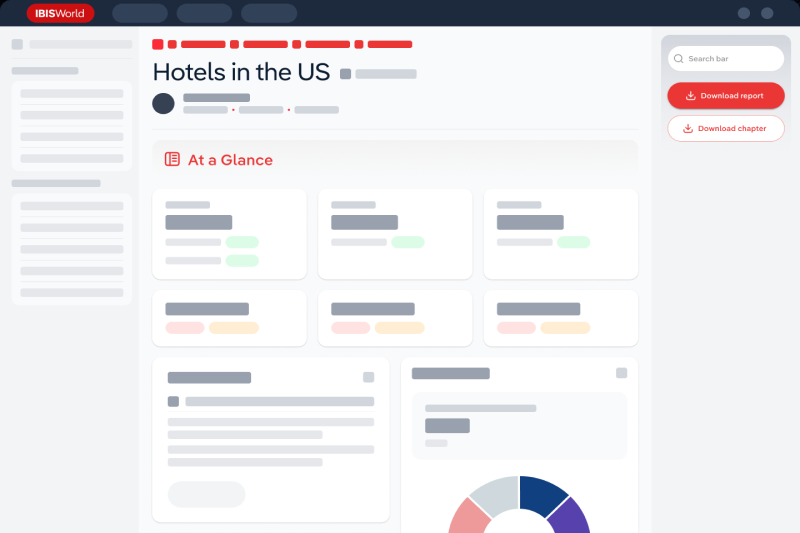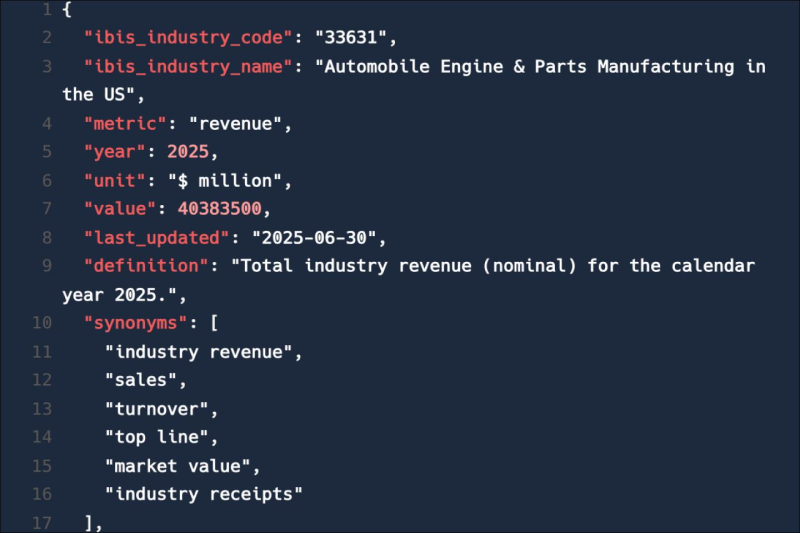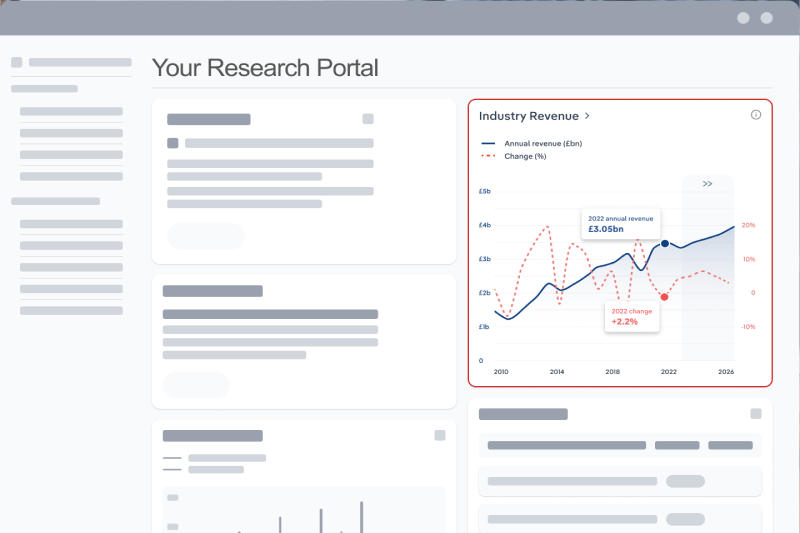IBISWorld Platform
Answer any industry question in minutes with our entire database at your fingertips.

Over the five years through 2025-26, allied health-care services' revenue is expected to rise at a compound annual rate of 1.8% to reach £5.7 billion. The ageing of the UK population has supported a solid demand for allied healthcare services, owing to the effects of the weakening of the body accompanying old age. Rising health consciousness and population growth have expanded allied healthcare services. The government has recently promoted preventative healthcare to relieve doctors' workload and get patients seen quickly.

Answer any industry question in minutes with our entire database at your fingertips.

Feed trusted, human-driven industry intelligence straight into your platform.

Streamline your workflow with IBISWorld’s intelligence built into your toolkit.
IBISWorld's research coverage on the Allied Health-Care Services industry in the United Kingdom includes market sizing, forecasting, data and analysis from 2015-2030. The most recent publication was released October 2025.
The Allied Health-Care Services industry in the United Kingdom operates under the SIC industry code SP0.125. Companies in this industry offer a range of ancillary healthcare services not provided by hospitals, doctors or dentists. Services provided under the allied healthcare umbrella include optometry, physiotherapy, occupational health therapy and supporting nursing care and chiropody. The industry also includes speech, art and language therapy. Paramedics and dietitians are also included in the industry. Radiographers are excluded. Related terms covered in the Allied Health-Care Services industry in the United Kingdom include national health service (nhs), clinical commissioning groups (ccg) and first contact physiotherapy.
Products and services covered in Allied Health-Care Services industry in the United Kingdom include Physiotherapy, Occupational therapy and Optometry.
Companies covered in the Allied Health-Care Services industry in the United Kingdom include NHS Devon ICB, Walgreens Boots Alliance Inc and Ascenti Group.
The Performance chapter covers detailed analysis, datasets, detailed current performance, sources of volatility and an outlook with forecasts for the Allied Health-Care Services industry in the United Kingdom.
Questions answered in this chapter include what's driving current industry performance, what influences industry volatility, how do successful businesses overcome volatility, what's driving the industry outlook. This analysis is supported with data and statistics on industry revenues, costs, profits, businesses and employees.
The Products and Markets chapter covers detailed products and service segmentation and analysis of major markets for the for the Allied Health-Care Services industry in the United Kingdom.
Questions answered in this chapter include how are the industry's products and services performing, what are innovations in industry products and services, what products or services do successful businesses offer and what's influencing demand from the industry's markets. This includes data and statistics on industry revenues by product and service segmentation and major markets.
The Geographic Breakdown chapter covers detailed analysis and datasets on regional performance of the Allied Health-Care Services industry in the United Kingdom.
Questions answered in this chapter include where are industry businesses located and how do businesses use location to their advantage. This includes data and statistics on industry revenues by location.
The Competitive Forces chapter covers the concentration, barriers to entry and supplier and buyer profiles in the Allied Health-Care Services industry in the United Kingdom. This includes data and statistics on industry market share concentration, barriers to entry, substitute products and buyer & supplier power.
Questions answered in this chapter include what impacts the industry's market share concentration, how do successful businesses handle concentration, what challenges do potential industry entrants face, how can potential entrants overcome barriers to entry, what are substitutes for industry services, how do successful businesses compete with substitutes and what power do buyers and suppliers have over the industry and how do successful businesses manage buyer & supplier power.
The Companies chapter covers Key Takeaways, Market Share and Companies in the Allied Health-Care Services industry in the United Kingdom. This includes data and analysis on companies operating in the industry that hold a market share greater than 5%.
Questions answered in this chapter include what companies have a meaningful market share and how each company is performing.
The External Environment chapter covers Key Takeaways, External Drivers, Regulation & Policy and Assistance in the Allied Health-Care Services industry in the United Kingdom. This includes data and statistics on factors impacting industry revenue such as economic indicators, regulation, policy and assistance programs.
Questions answered in this chapter include what demographic and macroeconomic factors impact the industry, what regulations impact the industry, what assistance is available to this industry.
The Financial Benchmarks chapter covers Key Takeaways, Cost Structure, Financial Ratios, Valuation Multiples and Key Ratios in the Allied Health-Care Services industry in the United Kingdom. This includes financial data and statistics on industry performance including key cost inputs, profitability, key financial ratios and enterprise value multiples.
Questions answered in this chapter include what trends impact industry costs and how financial ratios have changed overtime.
The Industry Data chapter includes 10 years of historical data with 5 years of forecast data covering statistics like revenue, industry value add, establishments, enterprises, employment and wages in the Allied Health-Care Services industry in the United Kingdom.
More than 6,000 businesses use IBISWorld to shape local and global economies
We were able to supplement our reports with IBISWorld’s information from both a qualitative and quantitative standpoint. All of our reporting now features some level of IBISWorld integration.

IBISWorld delivers the crisp business knowledge we need to drive our business. Whether it be serving up our major clients, winning new business or educating on industry issues, IBISWorld brings real value.

IBISWorld has revolutionised business information — which has proved commercially invaluable to exporters, investors and public policy professionals in Australia and overseas.

When you’re able to speak to clients and be knowledgeable about what they do and the state that they operate in, they’re going to trust you a lot more.

The market size of the Allied Health-Care Services industry in the United Kingdom is £5.7bn in 2026.
There are 13,159 businesses in the Allied Health-Care Services industry in the United Kingdom, which has grown at a CAGR of 3.4 % between 2020 and 2025.
The Allied Health-Care Services industry in the United Kingdom is unlikely to be materially impacted by import tariffs with imports accounting for a low share of industry revenue.
The Allied Health-Care Services industry in the United Kingdom is unlikely to be materially impacted by export tariffs with exports accounting for a low share of industry revenue.
The market size of the Allied Health-Care Services industry in the United Kingdom has been growing at a CAGR of 1.8 % between 2020 and 2025.
Over the next five years, the Allied Health-Care Services industry in the United Kingdom is expected to grow.
The biggest companies operating in the Allied Health-Care Services industry in the United Kingdom are NHS Devon ICB, Walgreens Boots Alliance Inc and Ascenti Group
Physiotherapy and Optometry are part of the Allied Health-Care Services industry in the United Kingdom.
The company holding the most market share in the Allied Health-Care Services industry in the United Kingdom is NHS Devon ICB.
The level of competition is moderate and increasing in the Allied Health-Care Services industry in the United Kingdom.




